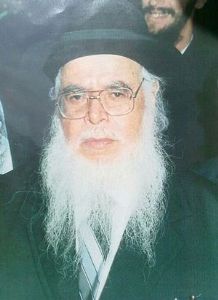A Short Tribute
Hacham Peretz Maimon was born on 21 Tishrei, 5677 (1917) in Gabes, Tunisia. His main Torah teacher was Hacham Haim Houri, who ordained him to the rabbinate and whose daughter, Nina, he was to marry. Hacham Peretz Maimon served as shochet and bodeq, as well as a Beit Din scribe, and also wrote ketubot. In 1932 he began a handwritten compilation of his piyyutim.
He immigrated to Israel in 1954, settling in the Gilat moshav, near the town of Ofaqim. He served as rabbi of the moshav and of the local Merhavim regional council for some fifty years. Following the death of Hacham Yaakov Cohen, he held the position of Ofaqim's rabbi as well, for a period of seven years.
Hacham Peretz Maimon fulfilled all religious roles, serving as teacher, adjudicator, shochet and mohel, cantor and ba'al koreh. As the moshav rabbi he often made halakhic rulings on issues pertaining to agriculture; he worked on having shmita year laws applied by farmers.
Hacham Peretz Maimon passed away on 11 Tishrei 5762 (2002) and was buried on the Gilat moshav.
Hacham Peretz Maimon's writings have been published in a three-volume book entitled Toldot Peretz. One volume deals in Halakhic questions, a second is a collection of sermons on the weekly Torah Readings, and the third contains innovative commentary on the Talmud.
A few quotes from the Rabbi on 'Customs of Israel' in which he teaches that an Ashkenazi who has settled in their moshav is to follow Sephardi custom
Question: Some twenty years ago an Ashkenazi man came to live among us in Gilat, having married a Sephardi (Tunisian) woman. He followed his Sephardi wife's customs on every matter for he knew nothing of his forefathers' customs, he also did not wish to follow their customs. They had, thank God, three children, two of them boys who 'earned the crown of Torah' and rose in sanctity and awe of Heaven. Somebody told one of the boys that he was to follow Ashkenazi custom, his father being Ashkenazi, and he came to me asking what he should do, both brothers having been my pupils when they were young and having since entered senior yeshivas; they are saintly in all good things, may God be their support, Amen.
Answer: Before asking me about the sons, ask about the father himself. Will he follow Ashkenazi custom or continue to follow his original custom? …Although the [book] HaPanim Me'irot states in part B paragraph 60 on page 121 that an Ashkenazi who acts lenient contrary to the RAM"A [Rabbi Meir Abulafia] must repent, our Master and Rabbi Rishon LeZion [Maran Rabbi Ovadia Yosef] wrote in Yabia 'Omer that this is certainly the case in their original places of abode, courts and palaces, but in the Land of Israel and its surroundings, where Maran's instruction has been accepted, one is certainly permitted to follow local custom in the place one resides…He wrote so in Avkat Rochel paragraph 212 as well, that Ashkenazim should follow Sephardim, because when the Jewish settlement was initiated the Sephardim were a majority, and Ashkenazim gradually increased in number little by little…Here, in Gilat, we have no independent Beit Din and all follow Sephardi custom…and since the father himself is permitted to follow Sephardi custom, his sons – who since their birth have followed this custom – are not to return to their forefathers' custom.
Toldot Peretz, Volume 1, Yoreh De'a Responsa, pp. 128 – 129, published by the author's family, Gilat, 1981
